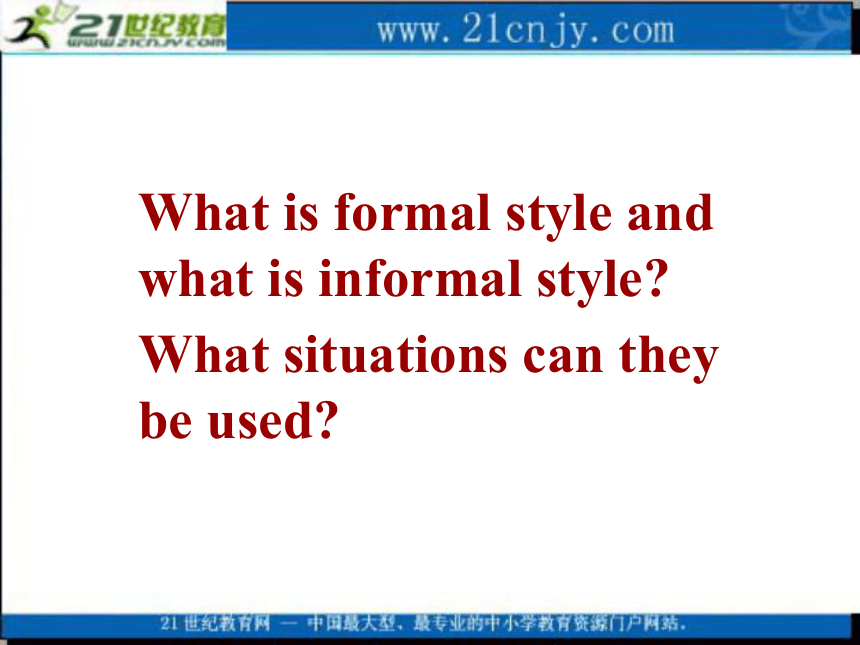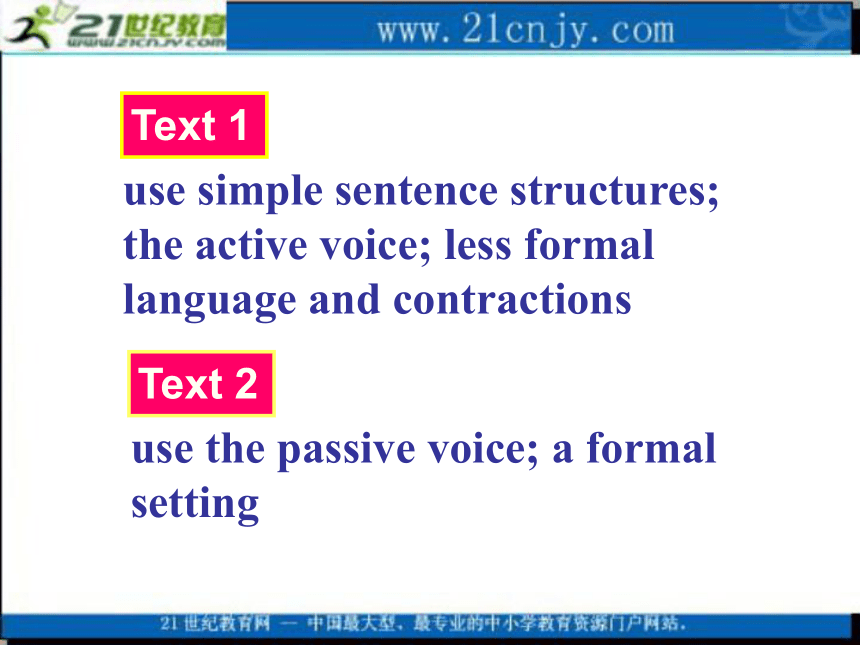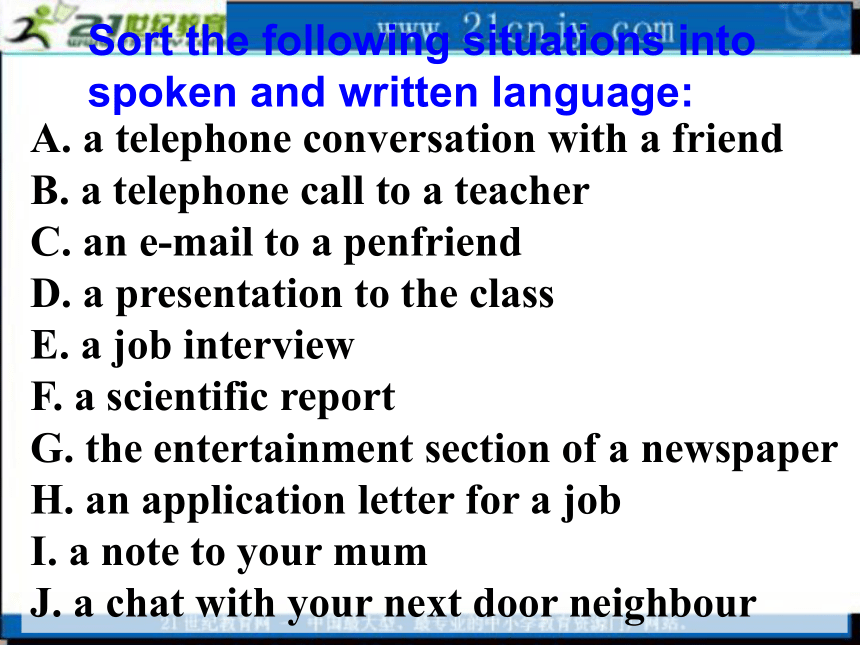英语:unit4 law and order-grammar and usage(牛津译林版选修10)
文档属性
| 名称 | 英语:unit4 law and order-grammar and usage(牛津译林版选修10) |  | |
| 格式 | rar | ||
| 文件大小 | 90.7KB | ||
| 资源类型 | 教案 | ||
| 版本资源 | 牛津译林版 | ||
| 科目 | 英语 | ||
| 更新时间 | 2009-09-08 11:34:00 | ||
图片预览









文档简介
课件21张PPT。Unit 4Grammar and usageLanguage stylesWhat is formal style and what is informal style?
What situations can they be used?Complex sentence structures, including the passive voice and subordinate clauses, as well as abstract nouns in the formal style of English. And simple sentence structures and active voice may often be used in the informal style.
A lot of colloquial language and
contractions may be found as well. Compare the following two texts
and try to decide which is formal
and which is informal.Text 1A: Hi, Mike. It’s Alice’s birthday
tomorrow. Shall we buy her a present?B: Yes, of course, what about some
flowers?A: Flowers are lovely. But I’d prefer to
get her a CD. You know she loves
music.B: Good idea.Text 2A: Good morning, Mr Smith. The report
is finished. Shall I present it to you? B: Please give it to me in an hour. I
have a meeting with some customers
about our new product.A: I am sorry to interrupt you. Please
inform me when you are finished and
have time to look at the report.B: Yes, I will.use simple sentence structures;
the active voice; less formal language and contractionsuse the passive voice; a formal
setting Text 1Text 2A. a telephone conversation with a friend
B. a telephone call to a teacher
C. an e-mail to a penfriend
D. a presentation to the class
E. a job interview
F. a scientific report
G. the entertainment section of a newspaper
H. an application letter for a job
I. a note to your mum
J. a chat with your next door neighbourSort the following situations into
spoken and written language:B D EA JF HC I GRank the following sentences in
order of formality, (1) being the
most formal and (6) the least formal.Hey, you—shut the door!
Would you be so kind as to shut
the door, please?
Visitors are requested to shut the door
quietly when leaving the building.
By order of the headmaster, these
doors must be kept shut at all times.
Please shut the door.
Would you mind shutting the door?(6)(3)(1)(2)(5)(4)Be quiet.
Could I trouble you to turn the
volume on the radio down a
little, please?
Visitors are politely requested
to keep their voices down at
all times.
Shut up!
Silence is requested in this area
while the examinations are
being given.
Please stop talking!(5)(3)(1)(6)(2)(4)Language points1. so…as to: 如此……以致… …, 表示结果He got up so early as to catch the
early bus.他起得如此早以致赶上了早班车。so…that…: 如此……以致……,
引导结果状语从句He got up so early that he caught
the early bus.so as to: 为了,相当于in order to,
但so as to不能用于句首。 so that: 为了,引导目的状语从句;
以致,引导结果状语从句。He got up very early so as to catch
the early bus.He got up very early so that he
could catch the early bus.他起得非常早以便可以赶上早班车。He got up very early so that he
caught the early bus.他起得非常早以致赶上了早班车。2. at all times: 无论何时,一直at times: 有时,不时at a time: 每次, 一次at one time: 曾经,一度at the same time: 同时You should be ready at all times
for the coming examination.你随时要为即将到来的考试做准备。He wrote to me at times when he
was abroad.他在国外时会不时地给我写信。You can borrow two books at a
time on the condition that you
return them on time.你每次可以借两本书只要你准时归还。We were good friends at one time.我们曾经是好朋友。Your performance in the driving
test didn't reach required standard,
_____, you failed. in the end??? B. after all???
C. in other words???D. at the same time典型题例3. mind: v. 介意,反对,常用于疑问句、否定句、条件句中。Do you think he'd mind if I borrowed
his book?你认为如果我借他的书他会介意吗?[+ ing form of verb] I don't mind
having a dog in the house so long
as it's clean.我不介意在家里养只狗,只要它干净。Thank you!
What situations can they be used?Complex sentence structures, including the passive voice and subordinate clauses, as well as abstract nouns in the formal style of English. And simple sentence structures and active voice may often be used in the informal style.
A lot of colloquial language and
contractions may be found as well. Compare the following two texts
and try to decide which is formal
and which is informal.Text 1A: Hi, Mike. It’s Alice’s birthday
tomorrow. Shall we buy her a present?B: Yes, of course, what about some
flowers?A: Flowers are lovely. But I’d prefer to
get her a CD. You know she loves
music.B: Good idea.Text 2A: Good morning, Mr Smith. The report
is finished. Shall I present it to you? B: Please give it to me in an hour. I
have a meeting with some customers
about our new product.A: I am sorry to interrupt you. Please
inform me when you are finished and
have time to look at the report.B: Yes, I will.use simple sentence structures;
the active voice; less formal language and contractionsuse the passive voice; a formal
setting Text 1Text 2A. a telephone conversation with a friend
B. a telephone call to a teacher
C. an e-mail to a penfriend
D. a presentation to the class
E. a job interview
F. a scientific report
G. the entertainment section of a newspaper
H. an application letter for a job
I. a note to your mum
J. a chat with your next door neighbourSort the following situations into
spoken and written language:B D EA JF HC I GRank the following sentences in
order of formality, (1) being the
most formal and (6) the least formal.Hey, you—shut the door!
Would you be so kind as to shut
the door, please?
Visitors are requested to shut the door
quietly when leaving the building.
By order of the headmaster, these
doors must be kept shut at all times.
Please shut the door.
Would you mind shutting the door?(6)(3)(1)(2)(5)(4)Be quiet.
Could I trouble you to turn the
volume on the radio down a
little, please?
Visitors are politely requested
to keep their voices down at
all times.
Shut up!
Silence is requested in this area
while the examinations are
being given.
Please stop talking!(5)(3)(1)(6)(2)(4)Language points1. so…as to: 如此……以致… …, 表示结果He got up so early as to catch the
early bus.他起得如此早以致赶上了早班车。so…that…: 如此……以致……,
引导结果状语从句He got up so early that he caught
the early bus.so as to: 为了,相当于in order to,
但so as to不能用于句首。 so that: 为了,引导目的状语从句;
以致,引导结果状语从句。He got up very early so as to catch
the early bus.He got up very early so that he
could catch the early bus.他起得非常早以便可以赶上早班车。He got up very early so that he
caught the early bus.他起得非常早以致赶上了早班车。2. at all times: 无论何时,一直at times: 有时,不时at a time: 每次, 一次at one time: 曾经,一度at the same time: 同时You should be ready at all times
for the coming examination.你随时要为即将到来的考试做准备。He wrote to me at times when he
was abroad.他在国外时会不时地给我写信。You can borrow two books at a
time on the condition that you
return them on time.你每次可以借两本书只要你准时归还。We were good friends at one time.我们曾经是好朋友。Your performance in the driving
test didn't reach required standard,
_____, you failed. in the end??? B. after all???
C. in other words???D. at the same time典型题例3. mind: v. 介意,反对,常用于疑问句、否定句、条件句中。Do you think he'd mind if I borrowed
his book?你认为如果我借他的书他会介意吗?[+ ing form of verb] I don't mind
having a dog in the house so long
as it's clean.我不介意在家里养只狗,只要它干净。Thank you!
同课章节目录
- 模块9
- Unit 1 Other countries, other cultures
- Unit 2 Witnessing time
- Unit 3 The meaning of colou
- Unit 4 Behind beliefs
- 模块10
- unit 1 building the future
- unit 2 people on the move
- unit 3 protecting ourselves
- unit 4 law and orde
- 模块11
- unit 1 careers and skills
- unit 2 getting a job
- unit 3 the secret of success
- unit 4 the next step
